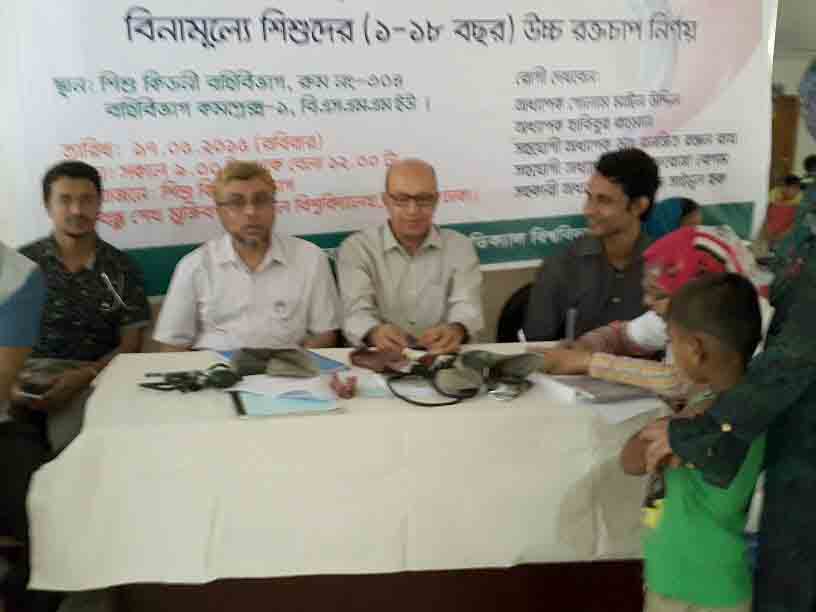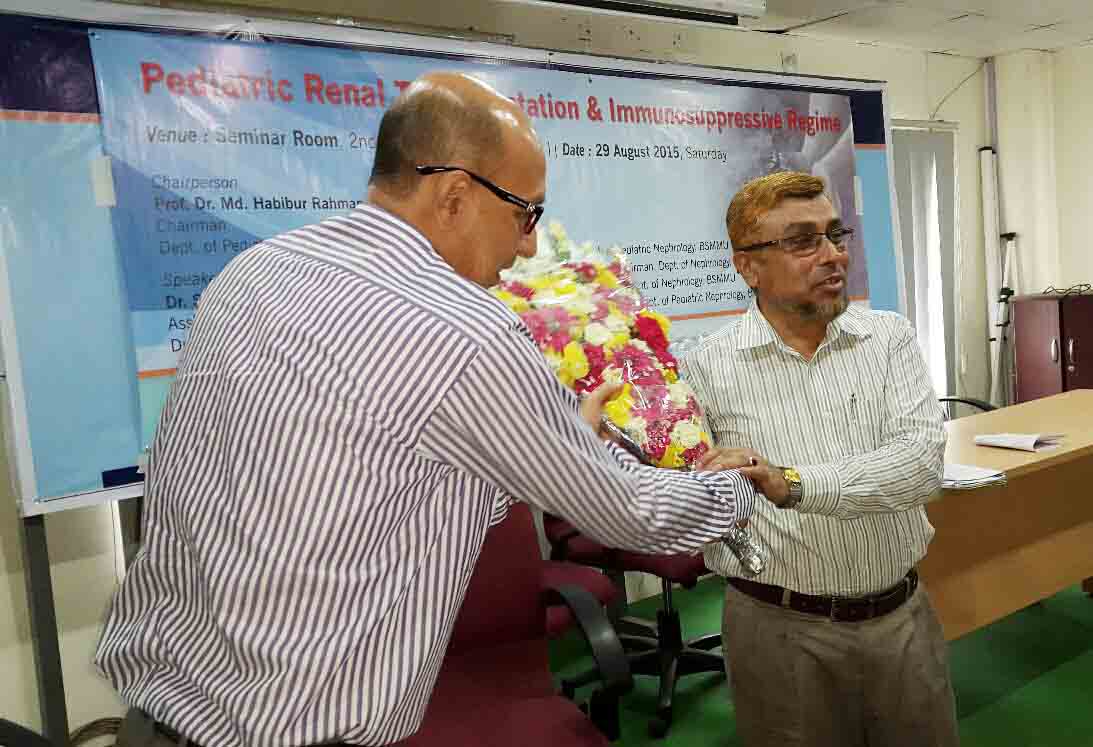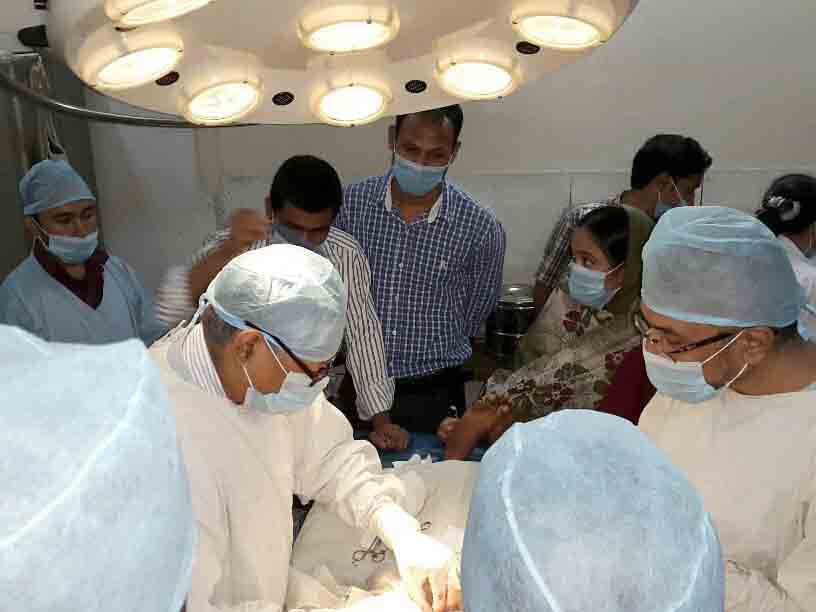Prof. Golam Muin Uddin
Professor & Ex-Chairman
Pediatric Nephrology
BSMMU
Interview by Abul Hasan
The Guardian: Please give us a short introduction to Pediatric kidney disease?
Professor Golam Muin Uddin (GMU): Kidneys are one of the vital organ without which life is incompatible. Kidneys disease has emerged as a public health problem all over the world. Bangladesh is no exception. Death due to chronic kidney disease 200 time more than normal age of patient.
There are 2 types of kidneys failure acute and chronic and a significant number of kidney disease is preventable and treatable so, early diagnosis is essential for a country like Bangladesh as treatment of kidney failure is expensive. In USA more than 7000 wait for transplant and 8 thousand transplantation done per year and budget is 29 billion dollar per year.
Professor Golam Muin Uddin is pioneer pediatric kidney specialist as most of the pediatric kidneys transplant had been performed in Pediatric Nephrology Department at BSMMU and all types treatment now available in BSMMU hospital by co-ordinate effort in his department.
We requested this efficient physician to give valuable massage for mass people of Bangladesh, he said as a nephrologists his appeal to mass people of Bangladesh is to inform that all types of kidney disease can occur in children and most of the cases remain undiagnosed until complete kidney failure as chronic kidney failure started from congenital, hereditary and acquired causes like infection, drugs, glomerulonephritis and renal stone, tumor, hypertension and diabetes acute kidney injury after diarrhea dysentery.
So, early diagnosis of structural abnormality antenatally by ultrasonography at 16-22nd weeks of gestational age and ultrasonography after any urinary tract infection and kidney problem and treatment of infection specially skin and sore throat (tonsillitis) should be prompt and early referral and not to use any drug without prescription of registered physician.
The Guardian: What is kidneys function?
Professor GMU: It starts on length 12 week of antenatal life till last days of life. This amazing kidney filters about 180 liter per working day and as a result excrete wastes from the body needs 2-3liter urine out daily, maintains let. Blood pressure blood producing hormone to activate vitamin D, to calcium haemostasis and excretion of drugs etc.
Each kidney contains 10 lacs nephron which is the functional unit of kidney.
Cause to kidney disease in children: Structural abnormality, hereditary cystic disease, obstruction in the passage and infection and trauma, drugs, glomerulonephritis, diabetes, vacuities and hypertension as well.
2 types of kidneys failure:-
Acute: hours to days
Chronic: more than 3 months (CKD) with ultimately end-stage renal disease (ESRD).
Dialysis transplantation is the main treatment without which patient will die.
The Guardian: In this context, would you say about kidney?
Professor GMU: You know you have two kidneys. They are bean-shaped and about the size of a fist. They are located in the middle of your back, on the left and right of your spine, just below your rib cage, in the abdomen, weight of each kidney about 150gm in adult.
The kidneys filter your blood, removing wastes and extra water to make urine. They also help control blood pressure and make hormones that your body needs to stay healthy. When the kidneys are damaged, wastes can build up in the body
The Guardian: What are the symptoms of kidney disease?
Professor GMU: Kidney disease is often called a “silent” killer, because most people have no symptoms in early kidney disease. In fact, you might feel just fine until your kidneys have almost stopped working. Do NOT wait for symptoms! Blood and urine tests are the only way to check for kidney damage or measure kidney function.
Signs and symptoms: as it is multisystem disease: polyuria polydipsia, growth failure, hypertension, anemia, vomiting, enuresis, dribbling, rickets, heart failure, hematuria, swelling of body, convulsion respiratory distress, dribbling of urine growth failure, hematuria.
The Guardian: How can we keep our kidneys healthy?
Professor GMU: You can keep your kidneys healthy longer by taking steps to control your diabetes and high blood pressure, plenty of fluid especially during diarrhea, vomiting. Manage your diabetes and high blood pressure by not to use medication by self.
- eating heart healthy foods: fresh fruits, fresh or frozen vegetables, whole grains, and low-fat dairy foods
- cutting back on salt
- limiting your alcohol intake
- being more physically active
- losing weight if you are overweight
- taking your medicines the way your provider tells you to
- keeping your cholesterol levels in the target range
- taking steps to quit, if you smoke, and
- Consult with your doctor regularly or any sign of kidney disease.
- Control of infection eg: skin+tonsillitis, urine infection.
- Fluid intake during diarrhea, vomiting
- Control of diabetes and hypertension
- Do not take nay medication without consult with registered physician.
The Guardian: What questions should one ask his doctor to find out about the health of his kidneys?
Professor GMU: When one visits his doctor, here are questions to ask about his kidneys.
- What is my GFR?
- What is my urine albumin result?
- What is my blood pressure?
- What is my blood glucose (for people with diabetes)?
- creatirine, S.albumin – most important to see kidney function.
The Guardian: What to do in suspected kidney disease in children?
Professor GMU: To consult Pediatrician those who are responsible to look after children below 16 years. If there is no urine output 10-12 hour referred to district or tertiaal hospital for evaluation by pediatric renal physician. Essential test for kidney are S.creatirine, Urine, Electrotypes urine, Protein, GFR, Osmolality.
The Guardian: Please discuss kidney Function and Aging.
Professor GMU: Kidney function may be reduced with aging. As the kidneys age, the number of filtering units in the kidney may decrease, the overall amount of kidney tissue may decrease, and the blood vessels that supply the kidney may harden, causing the kidneys to filter blood more slowly.
If your kidneys begin to filter less well as you age, you may be more likely to have complications from certain medicines. There may be an unsafe buildup of medicines that are removed from your blood by your kidneys. Also, your kidneys may be more sensitive to certain medicines. For example, nonsteroidal anti-inflammatory drugs (NSAIDs) and some antibiotics may harm your kidneys in some situations. The next time you pick up a prescription or buy an over-the-counter medicine or supplement, ask your pharmacist how the product may affect your kidneys and interact with your other medicines.
The Guardian: What is kidney failure?
Professor GMU: Kidney disease can get worse over time, and may lead to kidney failure. Kidney failure means very advanced kidney damage with less than 15% normal function. End-stage renal disease (ESRD) is kidney failure treated by dialysis or kidney transplant. But there are 5 stage of chronic kidney disease, up to stage 4 no need for dialysis and transplant by medical treatment patient can enjoy normal life.
If the kidneys fail, treatment options such as dialysis or a kidney transplant can help replace kidney function. Some patients choose not to treat kidney failure with dialysis or a transplant. If your kidneys fail, talk with your health care provider about choosing a treatment that is right for you.
The Guardian: Please discuss the treatment for kidney disease.
Professor GMU: There are several types of treatments related to kidney disease. Some are used in earlier stages of kidney disease to protect your kidneys. These medications and lifestyle changes help you maintain kidney function and delay kidney failure. To control blood pressure, Anemia, infection, underlying cause treatment of treatments, such as dialysis and transplantation, are used to treat kidney failure. When GFR <15 ml/min//1.73 squre meter these methods help replace kidney function if your own kidneys have stopped working.
Treatments for Early Kidney Disease
Treatments for early kidney disease include both diet and lifestyle changes and medications.
- Making heart-healthy food choices and exercising regularly to maintain a healthy weight can help prevent the diseases that cause further kidney damage.
- If you already have diabetes and/or high blood pressure, keeping these conditions under control can keep them from causing further damage to your kidneys.
- Choose and prepare foods with less salt and sodium. Aim for less than 1-2 m-mol/letter milligrams of sodium each day.
- Eat the right amount of protein. Although it is important to eat enough protein to stay healthy, excess protein makes your kidneys work harder. Eating less protein may help delay progression to kidney failure. Talk to your dietitian or other health care provider about what is the right amount of protein for you.
- If you have been diagnosed with kidney disease, ask your doctor about seeing a dietitian. A dietitian can teach you how to choose foods that are easier on your kidneys. You will also learn about the nutrients that matter for kidney disease. You can find a dietitian near you through the Academy of Nutrition and Dietetics directory.
- If you smoke, take steps to quit. Cigarette smoking can make kidney damage worse.
Medicines
Medicines can also help protect the kidneys. People with kidney disease often take medicines to lower blood pressure, control blood glucose, and lower blood cholesterol, prevention of infection and treatment of causes.
Two types of blood pressure medicines- angiotensin-converting enzyme (ACE) inhibitors, and angiotensin receptor blockers (ARBs) -may protect the kidneys and delay kidney failure. These medicines may even protect kidney function in people who don’t have high blood pressure.
Many people need two or more medicines to keep their blood pressure at a healthy level. For most people, the blood pressure target is less than 140/90 mm Hg. An ACE inhibitor, ARB, or diuretic (water pill) may help control blood pressure. Your healthcare provider will work with you to choose the right medicines for you.
The Guardian: Would you tell us in detail about dialysis?
Professor GMU: Dialysis is a treatment that takes waste products and extra fluid accumulate in the blood due to kidney failure out of your body. There are two types of dialysis. These are hemodialysis and peritoneal dialysis.
Hemodialysis: In hemodialysis, blood is run through a filter outside of your body and the clean blood is returned to the body. Hemodialysis is usually done at a dialysis medicine three times a week, but it can also be done at home. Each session usually lasts between three and four hours
Peritoneal dialysis: It is another way to remove wastes from your blood. This kind of dialysis uses the lining of your abdominal cavity (the space in your body that holds organs like the stomach, intestines, and liver) to filter your blood. It works by putting a special fluid into your abdomen that absorbs waste products in your blood as it passes through small blood vessels in this lining. This fluid with the waste products is then drained away. A key benefit of peritoneal dialysis is that it can be done at home, while you sleep.
Hemodialysis and peritoneal dialysis do not cure kidney failure. They are treatments that help replace the function of the kidneys and may help you feel better and live longer. Transplantation offers least rehabilitation for all ages.
The Guardian: How can one live with kidney disease?
Professor GMU: It is very necessary to monitor your kidney health routine wise.Many people with kidney disease don’t have symptoms until their kidney damage is very advanced. For most people, the only way to know about your kidney health is through blood and urine tests. The blood test checks your GFR, or glomerular filtration rate and the urine test checks for albumin. These two tests are also used to follow the progression of your kidney disease.
Besides, you need to follow these instructions very seriously, avoid nephrotoxic drugs.
Control Your Blood Pressure and Diabetes
The most important thing you can do to slow down kidney disease is keep your blood pressure at or below the target set by your health care provider. For most people, the blood pressure target is less than 140/90 mm Hg. This may delay or prevent kidney failure. In a patient with diabetes Blood presser should the 130/80 mm or less.
Have Your HbA1C Checked for patient and diabetes
People with diabetes may have their A1C checked. The A1C test shows the average level of glucose (or sugar) in your blood over the last 3 months in patient with diabetes. with diabetes. Lowering your A1C can help you to stay healthy. Should the below <7.
Diet and Lifestyle Changes
People with kidney disease can continue to live productive lives: working, enjoying friends and family, and staying physically active. You may need to make some changes to your diet and lifestyle to help you live a healthier and longer life. Because heart attack and stroke are more common among people with kidney disease, these changes are good for your heart and for your kidneys.
Lifestyle Changes
Following a healthy lifestyle is good for people with kidney disease, especially if you have diabetes, high blood pressure, or both. Talk with your dietitian, diabetes educator, or other health care professional about which actions are most important for you to take. As you will see, many of these actions are related.
- Keep your blood pressure at the target set by your health care provider. For most people, the blood pressure target is less than 140/90 mm Hg. Eating less sodium may help you control your blood pressure. Aim for less than 2300 milligrams (mg) of sodium each day.
- If you have diabetes, control your blood glucose level. Good blood glucose control may help prevent or delay diabetes complications, including kidney disease.
- Keep your blood cholesterol in your target range. Diet, being active, maintaining a healthy weight, and medicines can all help control your blood cholesterol level.
- Take medicines the way your provider tells you to.
Diet Changes
What you eat and drink may help slow down kidney disease. Some foods may be better for your kidneys than others. Cooking your food from scratch gives you control over what you eat.
Your provider may suggest you see a dietitian. A dietitian can teach you how to choose foods that are easier on your kidneys. You will also learn about the nutrients that matter for kidney disease.
The Guardian: So far it is learnt that there are some five steps to follow by a kidney patient to keep him well. Please discuss these.
Professor GMU: The steps below will help you eat right as you manage your kidney disease. The first three steps (1-3) are important for all people with kidney disease. The last two steps (4-5) may become important as your kidneys become more damaged.
STEP 1: Choose and prepare foods with less salt and sodium.
Why? To help keep your blood pressure at a healthy level. Aim for less than 1-2m.mol/litter sodium each day.
- Buy fresh food more often. Sodium (a part of salt) is added to many packaged foods. Most of the salt and sodium people eat come from prepared foods, not from the salt shaker.
- Use spices, herbs, and sodium-free seasonings in place of salt.
- Check the Nutrition Facts label on food packages for sodium. A Daily Value of 20% or more means the food is high in sodium.
- Try lower-sodium versions of frozen dinners and other convenience foods.
- Rinse canned vegetables, beans, meats, and fish with water before eating.
- Do not use salt substitutes.
STEP 2: Eat the right amount and the right types of protein.
Why? To help protect your kidney.
- Eat small portions of protein foods, fish protein especial large fish preferable.
- Protein is found in foods from plants and animals. Talk to your dietitian about how to choose the right combination for you.
STEP 3: Choose foods that are healthy for your heart.
Why? To protect your blood vessels, heart, and kidneys.
- Bake, roast, stew, grill, broil, or stir-fry foods instead of frying.
- Cook with nonstick cooking spray or a small amount of olive oil instead of butter.
- Trim fat from meat and remove skin from poultry before eating.
STEP 4: Choose foods with less phosphorus.
Why? To help protect your bones and blood vessels.
- Avoid milk of milk products cheese, butter.
- As your kidneys become damaged, you may need to eat foods that are lower in phosphorus. Ask your health care provider or dietitian if you need to eat less phosphorus.
- Many packaged foods have added phosphorus. Look for phosphorus—or for words with “PHOS”-on ingredient labels.
- Deli meats and some fresh meat and poultry can have added phosphorus. Ask the butcher to help you pick fresh meats without added phosphorus.
STEP 5: Choose foods that have the right amount of potassium.
Why? To help your nerves and muscles work the right way. If potassium is too high or too low, your nerves and muscles will not work normally.
- As your kidneys become damaged, you may need to eat foods that are lower in potassium. Ask your health care provider or dietitian if you need to eat less potassium. Fruits are the main source of potassium so, avoid potassium as kidney disease progress
- If you need to limit potassium, choose foods that don’t have added potassium chloride. Look for potassium chloride on the ingredient labels.
- Do not use salt substitutes. They can be very high in potassium.
- Drain canned fruits and vegetables before eating.
The Guardian: In this context, would you tell us about beverages that can take by a kidney patient?
Professor GMU: Having kidney disease also means you may need to change what you drink.
- Most people don’t benefit from drinking water when they are not thirsty unless they have kidney stones. Drink as much water as you normally do.
- Soda and other drinks. If you are told to limit phosphorus, choose light-colored soda (or pop), like lemon-lime, and homemade iced tea and lemonade. Dark-colored sodas, fruit punch, and some bottled and canned iced teas can have added phosphorus.
- If you are told to limit potassium, drink apple, grape, or cranberry juice instead of orange juice.
The Guardian: Now please discuss how kidney disease affect children?
Professor GMU: Kidney disease can affect children in various ways, ranging from treatable disorders without long-term consequences to life-threatening conditions. Acute kidney disease develops suddenly, lasts a short time, and can be serious with long-lasting consequences or may go away completely once the underlying cause has been treated. Chronic kidney disease (CKD) does not go away with treatment and tends to get worse over time. CKD eventually leads to kidney failure, described as end-stage kidney disease or ESRD when treated with a kidney transplant or blood-filtering treatments called dialysis. There all are not of kidney disease eg: infection, glomerulonephritis, heriaitang kidney disease polycystic kidney disease, hypertension, infection vascularties eg: S.U.E some presentable of are treatable if diagnose early.
Children with CKD or kidney failure face many challenges, which can include
- a negative self-image, growth failure, five child attendance.
- relationship problems
- behavior problems
- learning problems
- trouble concentrating
- delayed language skills development
- delayed motor skills development
The Guardian: And discuss the causes of kidney disease in children?
Professor GMU: Kidney disease in children can be caused by
- Congenital
- Pre-maturity
- Hereditary diseases
- Hydronephrosis, Single kidney.
- Cystic kidney disease.
- Infection
- Nephrotic syndrome
- Systemic diseases
- Trauma
- Urine blockage or reflux
- Glomerulonephritis
- vasculits:- S.L.E.
- Renal stone
From birth to age 4, congenital and hereditary diseases are the leading causes of kidney failure. Between ages 5 and 14, kidney failure is most commonly caused by hereditary diseases, nephrotic syndrome, and systemic diseases. Between ages 15 and 19, diseases that affect the glomeruli are the leading cause of kidney failure, and hereditary diseases become less common.
The Guardian: Would you discuss how kidney disease in children is treated?
Professor GMU: Treatment for kidney disease in children depends on the cause of the illness. A child may be referred to a pediatric nephrologists/child specialist.
The health care provider may prescribe:
- angiotensin-converting enzyme (ACE) inhibitors, which help relax blood vessels and make it easier for the heart to pump blood.
- angiotensin receptor blockers (ARBs), which help relax blood vessels and make it easier for the heart to pump blood.
- diuretics, medications that increase urine output.
Many children require two or more medications to control their blood pressure; other types of blood pressure medications may also be needed.
As kidney function declines, children may need treatment for anemia and growth failure. Anemia is treated with a hormone called erythropoietin, which stimulates the bone marrow to produce red blood cells. Children with growth failure may need to make dietary changes and take food supplements or growth hormone injections.
The Guardian: How does one know if his child is at risk for kidney disease?
Professor GMU: Your child may be at risk for kidney disease if he or she:
- Is overweight, not growing well, delayed milestone voiding, problem enuresis vomiting, recurrent urinary tract infection polyuria
- has pain in the back, side, or lower belly, recurrent abdominal pain
- complains of burning or pain when urinating, has changes in the urine, or often wets his or her pants
- has unexplained fever voiding problem
- has swelling in the feet, ankles, or legs
- wakes up with swollen eyelids
- becomes dehydrated often, polyuria, polydypsia
- has a family history of with kidney disease
Other conditions that may put your child at increased risk for kidney disease include:
- SGA (small for gestational age) or born premature
- a growth disorder
- diabetes
- high blood pressure
- rickets (soft bones caused by too little vitamin D)
- other conditions that run in families, such as polycystic kidney disease, Alport Syndrome, or heart disease
- becomes dehydrated often
- has a family history of kidney disease, hypertension
The Guardian: Please discuss eating, diet, and nutrition for children affected in kidney disease.
Professor GMU: For children with CKD, learning about nutrition is vital because their diet can affect kidney work. Parents or guardians should always consult with their child’s health care team before making any dietary changes. Staying healthy with CKD requires paying close attention to the following elements of a diet:
- Protein. Children with CKD should eat enough protein for growth while limiting high protein intake. Too much protein can put an extra burden on the kidneys and cause kidney function to decline faster. Protein needs increase when a child is on dialysis because the dialysis process removes protein from the child’s blood. The health care team recommends the amount of protein needed for the child. Foods with protein include
- Eggs
- Chicken
- Fish, sea fish protein with high biological value
- Beans
- Sodium. The amount of sodium children need depends on the stage of their kidney disease, their age, and sometimes other factors. The health care team may recommend limiting or adding sodium and salt to the diet. Foods high in sodium include
- Canned foods
- Some frozen foods
- Most processed foods
- Some snack foods, such as chips and crackers
- Potassium. Potassium levels need to stay in the normal range for children with CKD, because too little or too much potassium can cause heart and muscle problems. Children may need to stay away from some fruits and vegetables or reduce the number of servings and portion sizes to make sure they do not take in too much potassium. The health care team recommends the amount of potassium a child needs. Low-potassium fruits and vegetables include
- apples
- cranberries
- strawberries
- blueberries
- raspberries
- pineapple
- cabbage
- boiled cauliflower
- mustard greens
- uncooked broccoli
- High-potassium fruits and vegetables include
- oranges
- melons
- apricots
- bananas
- potatoes
- tomatoes
- sweet potatoes
- cooked spinach
- cooked broccoli
- Phosphorus. Children with CKD need to control the level of phosphorus in their blood because too much phosphorus pulls calcium from the bones, making them weaker and more likely to break. Too much phosphorus also can cause itchy skin and red eyes. As CKD progresses, a child may need to take a phosphate binder with meals to lower the concentration of phosphorus in the blood. Phosphorus is found in high-protein foods. Foods with low levels of phosphorus include milk of milk products contain high phosphate, it should be avoid.
- liquid nondairy creamer
- green beans
- popcorn
- unprocessed meats from a butcher
- lemon-lime soda
- root beer
- powdered iced tea and lemonade mixes
- rice and corn cereals
- egg white
- sorbet
- Fluids. Early in CKD, a child’s damaged kidneys may produce either too much or too little urine, which can lead to swelling or dehydration. As CKD progresses, children may need to limit fluid intake. The health care provider will tell the child and parents or guardians the goal for fluid intake.
The Guardian: In this context, please suggest specific points to remember.
Professor GMU: Of course, the points stated here are to be remembered carefully.
- Kidney disease can affect children in various ways, ranging from treatable disorders without long-term consequences to life-threatening conditions. Acute kidney disease develops suddenly, lasts a short time, and can be serious with long-lasting consequences, or may go away completely once the underlying cause has been treated.
- Chronic kidney disease (CKD) does not go away with treatment and tends to get worse over time.
- Kidney disease in children can be caused by
- Congenital/ hereditary about 30-50%
- Infection
- Nephrotic syndrome/ glomerulonephritis
- Systemic diseases
- Trauma
- Urine blockage or reflux, acute renal failure may progress to CKD
- A health care provider diagnoses kidney disease in children by completing a physical exam, asking for a medical history, and reviewing signs and symptoms. To confirm diagnosis, the health care provider may order one or more of the following tests:
- urine analysis: Protein, specific gravity, easte, sugar
- blood test
- imaging studies: USG
- kidney biopsy
- Treatment for kidney disease in children depends on the cause of the illness.
- Children with a kidney disease that is causing high blood pressure may need to take medications to lower their blood pressure. Improving blood pressure can significantly slow the progression of kidney disease. As kidney function declines, children may need treatment for anemia and growth failure, rickets acidosis, ESRD when GFR<15 ml/1.73sqare meter in children.
- Children with kidney disease that leads to kidney failure must receive treatment to replace the work the kidneys do. The two types of treatment are dialysis and transplantation.
- For children with CKD, learning about nutrition is vital because their diet can affect how well their kidneys work. Parents or guardians should always consult with their children physician before making any dietary changes.
The Guardian: Where treatment for pediatric renal patient is available?
Professor GMU: Where competent paediatricians are available + referred to pediatric nephrologists for children up to 18 years, for ESRD/ kidney failure patient as the require renal replacement therapy only patient with CKD in department of Pediatric Nephrology of BSMMU is the best center for the country.
The Guardian: Thanks. Now, would you inform us when the Department of Pediatric Nephrology started at BSMMU?
Professor GMU: Pediatric Nephrology initially started as a using in paediatrics and later as a separate department in BSMMU
The Guardian: And say what facilities for treatment are available at BSMMU?
Professor GMU: All types of facilities for kidney disease available dialysis (peritorial+ hemodialysis) renal transplantation.
The Guardian: In this context, would mention the number of bed available for patients at your department and how many patients you can accommodate for treatment?
Professor GMU: Number of bed 26.
The Guardian: And also mention the number of doctors, nurses, equipment and other relevant facilities available at your department for providing better treatment to patients and quality education to students.
Professor GMU: Five consultant and residents.
The Guardian: In the end, what is your message for your present and future generation doctors and especially for the mass-people of Bangladesh?
Professor GMU: Kidney disease may affect any children since or …..so during antenatal check up by Ultrasography ask your doctor whether any congenital defects and there or not.
When following manifestations are not seen. Consult with your physician to exclude kidney disease:
- Not glowing well/ undiagnosed vomiting
- Any problem with voiding/ passing urine
- Recurrent urine infection
- Blurring a vision
- Headache/ convulsion
- Respiratory distress of unknown cause.
- If a child unable to pass or stop urination from any systemic illness
- Do not take any medicine of unknown composition without registered doctor’s prescription.
Profile of Professor Golam Muin Uddin
Passed MBBS (1983) regular, FCPS (Pediatric) 1992, FRCP (Edin U/K) 2006. Worked in the department of Paedritic Nephrology since 1993. Worked as Chairman Paedritic Nephrology july 2012 to 2015. Professor Muin Uddin of publication: about 15 of national 30.
Member of international paedatric nephrology + International Society of Nephrology. Asian Society of Nephrology. Bangladesh Renal Association. Paedatric Nephrology Society of Bangladesh and Bangladesh Pediatric Association
Achievement: Peadatric 1st kidney transplantation in BSMMU in January 2006.
Contact E-mail: gmu.bsmmu@gmail.com



















